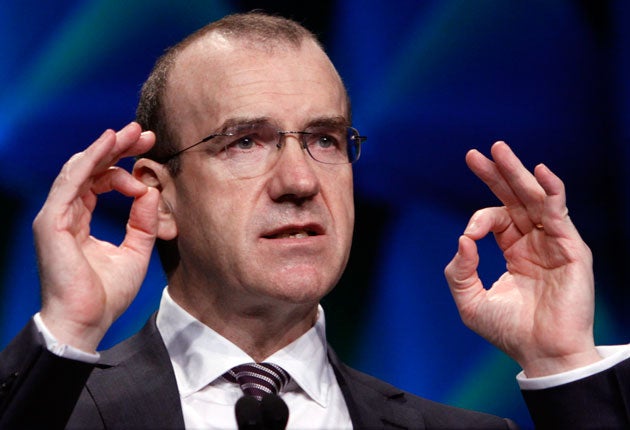Leahy invests in 'safe' tobacco (after Tesco made a killing on cigarettes)

Your support helps us to tell the story
From reproductive rights to climate change to Big Tech, The Independent is on the ground when the story is developing. Whether it's investigating the financials of Elon Musk's pro-Trump PAC or producing our latest documentary, 'The A Word', which shines a light on the American women fighting for reproductive rights, we know how important it is to parse out the facts from the messaging.
At such a critical moment in US history, we need reporters on the ground. Your donation allows us to keep sending journalists to speak to both sides of the story.
The Independent is trusted by Americans across the entire political spectrum. And unlike many other quality news outlets, we choose not to lock Americans out of our reporting and analysis with paywalls. We believe quality journalism should be available to everyone, paid for by those who can afford it.
Your support makes all the difference.It has been the dream of health campaigners and nicotine addicts for 50 years: a "safe" cigarette that satisfies the cravings of smokers without the lethal side-effects. Now, falling sales and government crackdowns in the West (if not in the developing world) are tempting the world's tobacco giants to invest in discovering a non-cancerous alternative. British American Tobacco (BAT) is joining forces with Sir Terry Leahy, the recently departed former Tesco chief executive, who is investing a chunk of his own £48m fortune in a new product which promises to revolutionise the market for "smokeless cigarettes". Sir Terry has invested an undisclosed sum in the start-up company Kind Consumer, which is developing a non-tobacco, aerosol-loaded, nicotine inhalation device that keeps the "psychological rituals and routines" of smoking.
The company claims that it will appeal to smokers who don't want to quit. Alex Hearn, chief product officer, said: "Our product contains no tobacco, heat nor smoke, just clean medicinal nicotine.
"It mimics the psychological rituals and routines of smoking, but it is designed also to match the physiological effects of nicotine intake by smokers."
Sir Terry added: "I believe it will make a difference, not only to the lives of smokers who have repeatedly tried to quit, but to the public health of our nation. "It makes perfect business sense too. There's a huge gap in the market for a product like this that sits between cigarettes and the very medicalised nicotine replacement therapies."
The product will be targeted at smoker-friendly sales locations such as petrol station counters and supermarkets, not pharmacies. Health campaigners fear that customers who enjoy the nicotine hit may use the product as complimentary, rather than an alternative, to a pack of cigarettes.
Kind Consumer has signed a global licensing agreement with Nicoventures, a new subsidiary of BAT. Philip Morris International, BAT's rival, is also investing in "clean cigarettes". The company has bought the patent for a similar aerosol system being developed by the same scientific team that discovered the potential for commercial nicotine patches in the 1980s.
Previously the "big four" – Philip Morris, BAT, Japan Tobacco and Imperial Tobacco – had left the £2.2bn market for "reduced harm" alternatives to pharmaceutical groups such as Johnson & Johnson, which produces Nicorette patches.
The tobacco giants need an alternative presence at retail locations, to combat new legal restrictions. The Government has promised a ban on the in-store display of tobacco products, which is due to be implemented by 2015. A ban on smoking in public places is now in place in New York, while Australia has announced the toughest measures yet. Under proposals due to come in next year, all logos will be removed from cigarette packets, which must be a drab olive-green colour and covered with graphic health warnings.
The tobacco giants are employing their legal armoury to oppose restrictions on smoking. Imperial Tobacco has forced a judicial review over a store display ban in Scotland, claiming that the Scottish Parliament had no legal right to restrict the open sale of its products.
The big tobacco companies have vowed to fight the Australian logo ban in the courts, with BAT threatening to flood the market with cheap cigarettes.
Smoking in numbers
£13.4bn Consumer spending on tobacco products in Britain in 2009, 90 per cent of which went on cigarettes.
£236bn Estimated value of the global tobacco market.
£1.36bn Value of the global nicotine replacement product market last year. Of this figure, 85 per cent was spent on gum and patches.
£10.5bn British tax revenues from tobacco products in 2009/10: £8.8bn in excise duty, and £1.7bn in VAT.
2.1 per cent Annual predicted growth rate in cigarette sales in the Asia-Pacific region over the next five years.
2 per cent The ammount sales in Western Europe are expected to shrink by over the same period.
Join our commenting forum
Join thought-provoking conversations, follow other Independent readers and see their replies
Comments